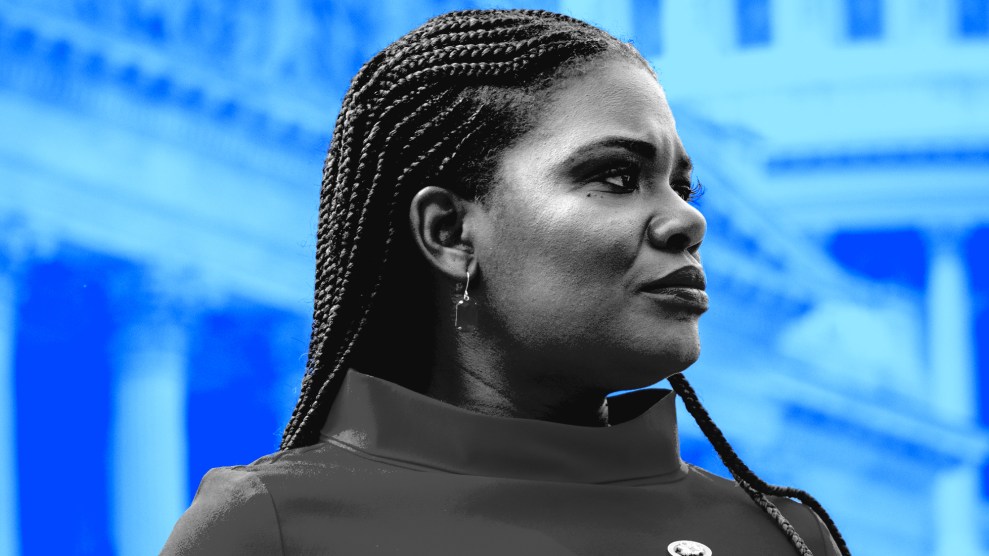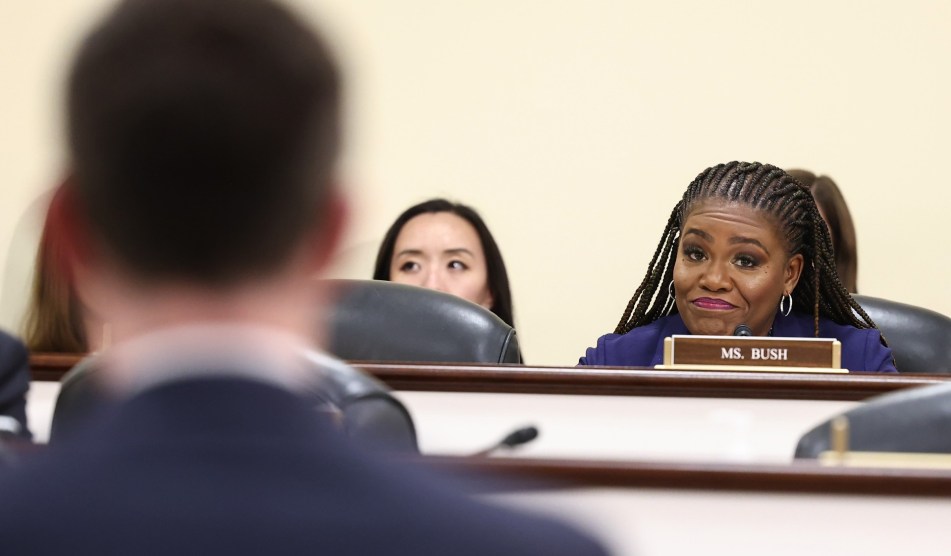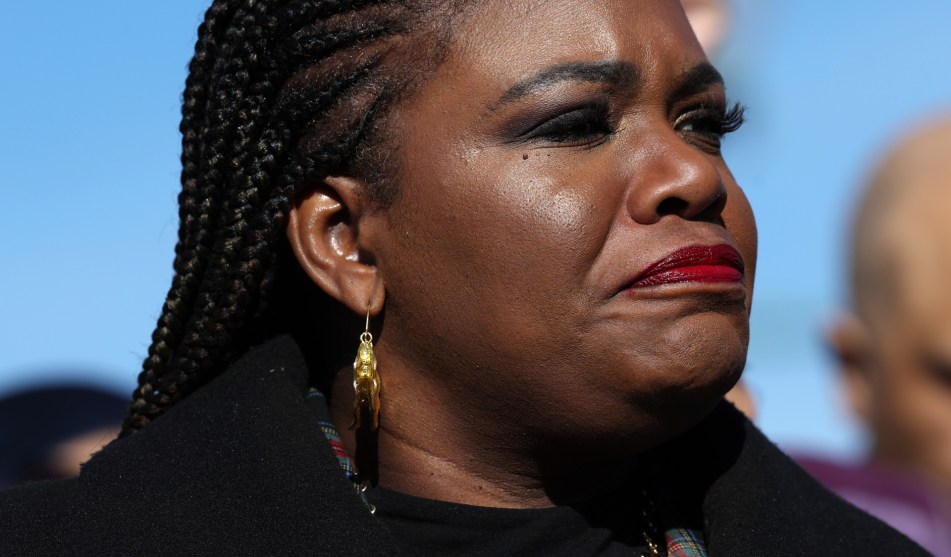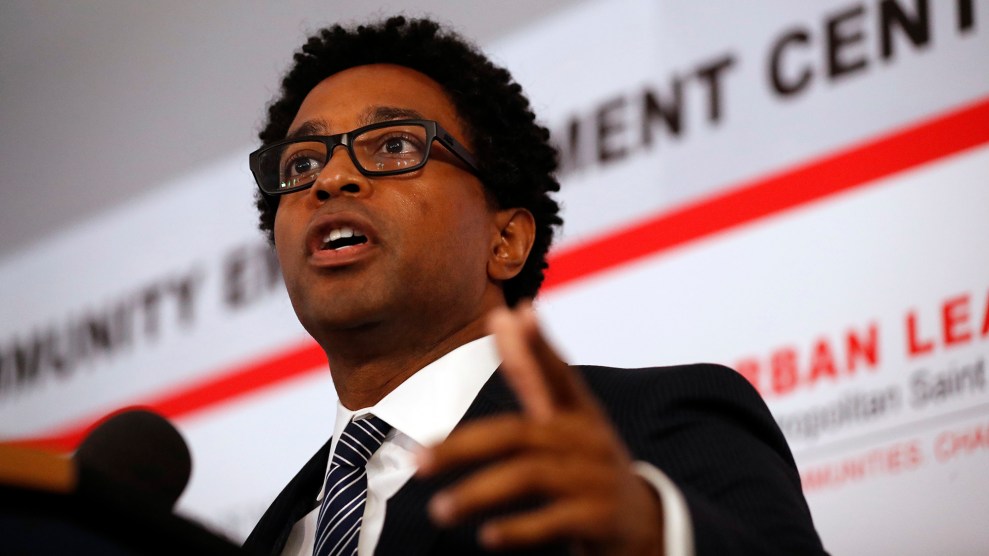
Cori Bush is the second progressive Congress member to lose her seat after calling for a ceasefire in Gaza.Mother Jones; Sue Dorfman/ZUMA
In one of the most watched primaries this year, Rep. Cori Bush (D-Mo.)—among the first members of Congress to call for a ceasefire—lost to St. Louis Prosecuting Attorney Wesley Bell, who jumped into the race late, and with the backing of millions of dollars from pro-Israel groups. The Associated Press called the race for Bell around 10:00 PM local time.
“Organized people beat organized money,” Bush’s campaigners have repeated. This race, however, has tested whether that’s true: as of election day, it is the second-most expensive Congressional primary in American history—and the money has, indeed, made a difference.
Bell dropped out of his bid to dethrone Republican Sen. Josh Hawley of Missouri and chose to challenge Bush soon after the war began in Gaza. Bell has benefited from an incredibly well-funded advertising campaign since then.
Over half of all the outside money spent on the race came from the United Democracy Project (UDP), the American Israel Public Affairs Committee (AIPAC)’s electoral arm. The money UDP spent here is second only to that which they spent on a successful campaign to defeat Rep. Jamaal Bowman in New York. In total, UDP spent nearly 9 million dollars in MO-01, bolstered by $1.5 million from the crypto PAC Fairshake. Bush and her backers also attracted some outside spending: Justice Democrats, a progressive PAC founded by former campaigners for Sen. Bernie Sanders (I-Vt.), sent $2 million her way.
Bell’s choice to take that money has been divisive. Mike Jones, a 75-year-old former alderman and Board of Education member with a long career in St. Louis politics put it this way: “I think everybody knows that the race is not about the issues that have surfaced. It’s about the issue nobody’s talking about.” On most issues, Bell and Bush’s stances are near-identical. “So, literally, the only reason for this campaign, at a political level, is AIPAC money,” Jones said.
Over a quarter of children in the district live in poverty, per the latest census numbers. Schools in the City of St. Louis are so underfunded that the district may not have a full fleet of school bus drivers this year. Healthcare access in the district remains limited, particularly for Black women—and abortion, which both candidates hope to restore, remains illegal in the state.
But the millions brought into the district for this campaign by outside groups on both sides of the election are not doing much to address those issues. Instead, they’re flooding people’s mailboxes with fliers, often several per day, about Bush not backing Biden, as I previously reported.
The campaign became vitriolic in its final weeks. Each candidate has dealt with leaked, compromising audio recordings: Bell swearing he wouldn’t run against Bush, only to renege on that promise; Bush comparing the DOJ investigation over her office’s money-management practices to the FBI spying on Martin Luther King Jr.
The youth voter-engagement group Protect Our Power has been on the ground in St. Louis for the past month knocking on doors. Many of those canvassing are the same young campaigners who powered Jamaal Bowman’s reelection campaign in New York, only to witness his defeat. Ella Weber, 22, was one of those campaigners said she and her Protect Our Power co-campaigners “went on a long walk” that night “and just like, talked about how important it was that we don’t retreat.” So they moved on quickly to the next “Squad” race to try again. They crashed on couches and canvassed for a month in St. Louis, working what Weber described as “70-hour weeks” for free. As they canvassed, though, they were up against a well-run and well-funded campaign on the other side.
“I think few times in my political experience have I seen it so clearly that voters are watching a lot of ads,” said Denae Ávila-Dickson of Sunrise Movement.
“I think people power is still putting up a really, really strong fight against this historic funding,” she told Mother Jones about 5 hours before the polls closed. “But I think the reality is that our election systems aren’t equipped to deal with the scale of spending that is in this race.”














